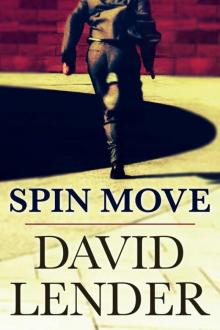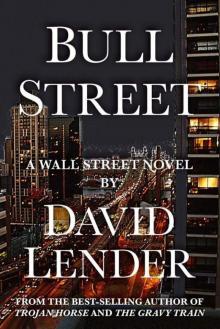- Home
- David Lender
Spin Move Page 6
Spin Move Read online
Page 6
Frank said, “Yeah, but there’s not a lot to do here. If this was gonna go on forever, I’d worry about Katie. Not much of a life for her.” He looked over at Rudiger, his face pensive. “But I’m not gonna last forever, and afterward she’ll have a chance at a real life again.”
Rudiger wasn’t sure what to say, so he didn’t say anything. After a moment he asked, “You want to keep going or turn around?”
“No, I’m good.”
They walked in silence, Rudiger throwing the ball for Styles.
“Although I do worry about Katie a little,” Frank said after a while. “When I’m gone she’ll be all alone. She’s been taking care of me in one way or another since her mom died.”
“That was a long time ago, wasn’t it?”
“Sixteen years. A car wreck. Katie was devastated, but after the funeral she kinda pushed her tears and grief down deep someplace. She said it was because she needed to take her mom’s role around the house. And she did. After school she shopped, cooked, cleaned, did the laundry, everything that Sarah did. So when I’m gone she won’t have anyone to take care of.” He looked over at Rudiger again. “I’m afraid all that stuff she buried down so deep is gonna come back up and clobber her.”
Late that afternoon Rudiger said, “I guess I should head up the road to one of those hotels.”
Frank said, “I won’t hear of it. I told you, you’re welcome here anytime, as long as you want to stay. Katie would say the same thing.”
It was settled.
They ate their dinner in front of the 70-inch Vizio on folding tray tables Rudiger found in a closet. Rudiger commandeered an upholstered chair from the upstairs living room, forced it into the elevator, then pulled it up next to Frank’s Barcalounger. Flora had thawed two rib eye steaks. She couldn’t refer to any of the beef without calling it “hormone and antibiotic free, grass fed,” and had a similar comment about any of the vegetables: “nice leftover kale, organic—no pesticides or fertilizers—you can reheat it for dinner, Mr. Rudiger.” Rudiger grilled the steaks outside and Frank was in his glory, taking his rib eye rare.
The “Oscar’s Birthday” episode of The Odd Couple had just ended. Frank was still laughing about it.
Rudiger enjoyed Frank’s reaction to the show as much as the show itself. He asked him, “You want another Jameson’s?”
“Why not? The only time I get to drink too much is when Katie’s not around. She keeps me on a pretty short leash.”
While Rudiger was fixing the drinks, Frank scrolled through the program guide. He said, “Not much on for another half hour. Then it’s Hawaii Five-0.”
“Works for me.” Rudiger handed Frank his Jameson and sat back down. Rudiger said, “You’d think with hundreds of channels that Dish Network would have more of the old stuff like we did back in New York. You’re, what, about ten years older than me? You remember channels 5, 9 and 11? Always something on. Mostly reruns, but those were some great old shows.”
“You grew up in New York?”
“Yeah. Hell’s Kitchen, 44th and 10th Avenue.”
They killed the next half hour talking and laughing about old TV shows. Gunsmoke was Frank’s favorite, The Rockford Files was Rudiger’s.
Frank said, “James Garner was perfect for the role of Rockford. A real average schlub as PI. You remember that stunt he would pull in the Firebird? When he was getting away from the bad guys where he’d stop, shift the Firebird into reverse, drive back in a straight line and yank the wheel around so the car would do a 180-degree spin, then shift into drive and speed off.”
Rudiger said, “Sure. It was his trademark move.”
“Yeah. The Secret Service calls it a ‘Rockford’ and they teach it to their agents as an evasive maneuver, even when driving for the president.”
“No shit?”
“No shit.” They both laughed. They sipped their drinks and watched the episode of Hawaii Five-0. When it ended Frank stood up and said, “I gotta take a leak.”
While Frank was in the bathroom, Rudiger scrolled around the program guide. When he got back, Rudiger said, “Frank, look at this.” He scrolled down to one station, then across to all the shows, called them out: “Maverick, My Three Sons, Gilligan’s Island, Gunsmoke, Leave It to Beaver, Kojak, All in the Family.”
Then he scrolled down to the station below it, then across again, calling out the old shows, then down to the next, then across, calling those out, finishing with, “And look, The Rockford Files. It’s a bonanza.”
“I never even saw those stations,” Frank said.
“I checked, but you don’t get any of them.”
Frank said, “Not yet.”
Rudiger and Frank spent the next two days the same way. Walking on the beach on the third day, Frank said, “It’s so beautiful here.” He looked at Rudiger with a wistful smile. “I only wish my son Mike could have had the benefit of this.”
“Katie told me about him. He died, what, four years ago?”
“Almost. She took that hard. It really changed her.”
“She told me she never felt like anybody ever did anything for Mike, or for you, after you both got sick.”
“Yeah. It’s different now, because the 9/11 first responders are finally getting the medical care they deserve. But back in the day when Mike got sick . . .” He shook his head. “Nothing. And yeah, Katie’s still bitter about that.”
“The way she talks about him, she really looked up to him.”
“Oh, man, growing up she idolized him. He was five years older, like a god to her. She was quite the tomboy. Mike never excluded her from anything. Back in the neighborhood, Cobble Hill in Brooklyn, he had to argue with the guys about putting her in stickball games on the street.” He looked over at Rudiger. “That is, until they saw her play. She was a great athlete, and competitive as hell. One time Mike brought her home with her whole leg and backside scraped up because she slid into home plate on the pavement. I asked her, ‘Why’d you do it?’ and she looked at me like I’d lost my mind and said, ‘Daddy, it was the winning run.’ She was feisty, could take care of herself. But most times she didn’t need to, because big brother Mike was around the neighborhood to make sure nobody messed with her. He even supported Katie when she busted her way onto the track team in high school.”
“Busted her way?”
“Yeah. They didn’t have a girls’ track team, so in her freshman year she just showed up the first day of practice. The coach said it was only for boys. Mike brought her to the principal and she argued her way to the school board. It took a year, but by the time she was a sophomore she was the only girl on the team. Ran the half-mile.”
“Man, that’s a tough race. The worst.”
“You ran track?”
“No, football, in college, defensive end.”
Frank looked over at him. “You must’ve been bigger then. You any good?”
“Yeah,” Rudiger said in almost a whisper. “All-American, two years.”
Frank shot him a glance. “Who’d you play for?”
“Harvard.”
“All-American. Jeez. Those guys usually turn pro. What happened? You get hurt?”
“No. It just wasn’t in the plan. I was a walk-on at Hofstra my sophomore year. Turns out I was good at defensive end. They say football’s a team sport, but for linemen that’s bull.” He looked over at Frank. “We linemen call our domain ‘the pit.’ Man against man, one-on-one. Brute force, smash-face, and”—he smiled—“a spin move like Lawrence Taylor and some brains don’t hurt, either. So Harvard recruited me with a full scholarship. It was never about the football, but that’s what got me to Harvard. Harvard undergrad got me into Harvard Business School. For me, that’s what it was about.” Rudiger looked off at the ocean.
Frank seemed to sense he didn’t want to talk any more about it, let it drop. After a moment Frank said, “So Katie’s coach sa
id she had ability, but she won races on pure heart. Always ran from the front the whole race. Ferocious. By her junior year nobody could kick past her at the finish. Mike saw most of her meets until her senior year when he started working full-time. But he took off from work to see her win the state sectionals that year. He’s most of the reason she went to law school.”
“Wasn’t he a fireman?”
“Yeah, after. But when Katie was in college, Mike was a paralegal, working for one of the big Wall Street law firms. He was doing great, working his way up, a career in front of him. Then he broke his ankle playing basketball and the docs put him on painkillers. I never learned about it until afterward, but Katie knew he got hooked on them. After Mike’s prescription ran out, the street cost was about twice the price of getting high on heroin. So he switched. I knew something was wrong but not what it was. Katie covered for him. She tried pretty much everything to get him straight, even paying for a couple of rehabs, flew with him to one in Florida.”
“So he beat it?”
Frank shook his head. “Even Katie thought Mike was fine when he came back the second time. But he was still using, and even figured out a way to steal from the law firm, from the runners taking cash and checks to the bank. Mike estimated he was into them for over 100 grand when they finally caught him.”
“Did they send him to jail?”
“Katie stepped in and talked to one of the partners, a woman who had always supported Mike, brought him along. She got the partner to agree that if Mike signed himself into a rehab and stayed clean a year, she’d keep it quiet and make sure the firm didn’t press charges.”
“Wow. What a break.”
“Yeah, and he took it to heart. He was never that religious, but he called it ‘a gift of grace from God.’ He got clean, joined a church where they shout ‘Praise the Lord’ all the time. A year later he came and asked me to help him get a job with the fire department. They called him ‘The Preacher’ at the station house.”
Rudiger motioned for Frank to go on.
“We were from different engine companies, but we worked on the same team for three months at the Trade Center after 9/11. I was never so proud of him. None of us knew what breathing in all that gunk down there would do to us.”
“When did he get sick?”
“About four years later.”
Frank looked over at Rudiger for a long moment.
Rudiger was ready for another throw—Styles in his position, staring at the ball, waiting—but he saw Frank’s eyes and dropped the Chuckit! launcher to his side.
Frank said, “By then Katie was out of law school, working for the Manhattan DA’s Office. She worked really long hours, but she’d come home to Cobble Hill to check in on Mike almost every night. If she had to work really late, some nights she’d stop home, have dinner with us and then go back to the office. Sometimes she’d stay over, sleep on the sofa in the living room. Many of those nights I could hear her crying in there when she thought I was asleep.”
Rudiger felt a lump in his throat.
Frank said, “Those were bad times. It took Mike two years to kinda shrivel into nothing. Hard to watch. Heartbreaking to watch Katie watch it.”
Rudiger now felt his throat thick with emotion. He had to cough to clear it before saying, “Katie told me she felt like Mike and you were owed.”
“Yeah. I guess that’s why it doesn’t bother me she’s hiding out here on some island in the middle of nowhere where they can’t extradite her.”
“So it’s a good life here?”
“It’s quiet, that’s all. I watch a lotta TV.”
Katie was seated in a conference room on the second floor of Banque d’affaires Ducasse. More wood, leather and oil paintings of old people. Ducasse and two of his young associates were seated across from her. Her banker from Amalgamated Swiss Bank, Mr. Bemelman, and a lawyer Bemelman had hired to advise Katie on her potential Ducasse investment flanked her. Ducasse had just finished answering a question of Katie’s, and now she glanced to her right to see if Dolger, the lawyer, had anything to say. Katie shook her head. Incredible.
She’d had two conference calls with Ducasse from Paris with the participation of Bemelman and Dolger. The previous afternoon she’d flown back to Geneva for a preparatory meeting with Bemelman and Dolger in ASB’s office. In all that time Dolger had hardly uttered a word other than, “Everything seems to be in order.” After that Bemelman would usually remind Katie that ASB had been doing business with Banque d’affaires Ducasse for hundreds of years.
Katie now looked across the table at Ducasse. He smiled at her, not his business smile, but the same smile as over dinner last night and as he’d kissed her good night in the backseat of his Bentley. What’s up with that? If he was going to make a move on her, get it over with. Two dinners and two good night kisses and that’s it? She was beginning to think she was right about him in the beginning: he was gay. Maybe he’s bi. Either way it creeped her out. And now that she thought about it, his kiss did, too. It reminded her of when she and Marco Rosetti, who lived next door in Cobble Hill when she was about seven, talked about seeing their parents kissing on the lips. They both wondered what it felt like and agreed to try it. After they did, each of them pulled away, wiped their mouths and said, “Eeww!”
But she wasn’t considering investing in Ducasse himself, just his fund, and the investment results for Funds I through IV spoke for themselves. As did the Private Placement Memorandum and the Subscription Agreement, which she’d read with a skilled and critical eye. She’d dissected hundreds of similar documents when working for the U.S. Attorney’s Office, and seen all sorts of securities frauds. She knew Swiss securities laws were slightly looser than those of the U.S., so she’d read the documents applying the standards from the U.S. They seemed airtight and on the up-and-up.
Katie was pretty sure she was leaning toward the right decision. She learned in her teens that she had trouble making decisions as easily as big brother Mike. She once talked to Mike about it. Mike had said, “Girls don’t make decisions like guys. Girls research everything, consider all the angles until they’re all twisted up. Even if guys are gonna do the same research, they pick a finite period of time and just say to themselves, ‘Okay, time to make up your mind.’ If it’s hard to decide between the options, you’re probably not making a mistake whatever you decide. If you get stuck, just go with your gut.”
That’s how Katie had made some major decisions in her life: going to law school; handing over prosecution of her biggest case at the Manhattan DA’s Office to a colleague so she could meet with the partner at Mike’s law firm when they caught him stealing; and deciding to drop Rich Stevens after her first year of law school. All the right choices. She’d basically made up her mind about Ducasse Fund V when she’d boarded the flight to Geneva from Cape Verde. Still, she wished she had someone who knew finance better than she did to lean on. Somebody like Rudiger. She realized the reason he now came to mind wasn’t just for his advice, but also because she was thinking about that kiss from Ducasse. Not at all like Rudiger’s. No question about it—when a real man kissed you, it could make your toes curl.
Katie looked to her left at Bemelman and said, “Any more questions for Philippe?” She didn’t bother to look at Dolger.
“No.”
Katie looked at Ducasse and said, “Okay, we’re done. I just need a little time to reflect.”
Everyone got up and shook hands. Ducasse showed Bemelman and Dolger out, and his associates trailed behind. Ducasse said, “When you’re ready, you can reach me on extension 101,” and left.
Twenty minutes later the phone in the conference room rang. It was Ducasse. “I was just wondering about your timetable. It’s getting near lunchtime and I can offer to buy you lunch if you like. Otherwise I can have something sent in for you.”
“Actually, I was just getting ready to call you. Can you come do
wn?”
Ducasse hesitated before responding, as if he thought she’d be delivering bad news, then said, “I’ll be right down.”
A minute later Ducasse walked in. Katie was still seated. He stepped to the chair at the head of the table and rested his hands on the back of it. He smiled, but she detected he was tense. He appeared poised to say something.
She waited, not to torment him, just to see what he had to say.
He said, “Before you respond, I thought I’d offer an additional tidbit of information that might interest you.”
Katie waited.
“We’re close to fleshing out enough commitments, approximately $200 million, to do a first close before the end of September. It would be a real boon to our fund-raising efforts to accomplish that. Other prospective investors would then have an opportunity to see we’re up and running before the critical fourth quarter. Most of our investors, primarily wealthy individuals and families, commit funds to new ventures only at the end of the year.”
Katie sat back in her chair. “Okay.”
“You may recall I mentioned in your last visit that were you to fund $30 million up front, we would offer you three percentage points of our firm’s carried interest in the fund. If you’d be willing to fund the $30 million today, we would offer you an additional two percentage points, for a total of 5% of our 20% carried interest. If you’re agreeable I can have one of my associates bring the papers and we can execute them right now.”
Katie said, “I didn’t see anything about that in the Private Placement Memorandum.”
“It’s disclosed in general, I believe under subsection 10.2 regarding preferred rates of return, but we memorialize the details in a side letter between us.”
It seemed odd to Katie, but she remembered that there were some differences between Swiss and U.S. law.
Katie said, “Okay. You bring the papers and I’ll call Mr. Bemelman to have him wire the funds once we sign.”
Ducasse smiled, looking relieved. “Excellent.”

 Arab Summer
Arab Summer Sasha Returns
Sasha Returns Spin Move
Spin Move Bull Street (A White Collar Crime Thriller)
Bull Street (A White Collar Crime Thriller) Vaccine Nation
Vaccine Nation Trojan Horse
Trojan Horse